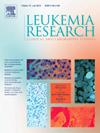RCHOP plus BTK inhibitor improves clinical outcomes in double expressor diffuse large B-cell lymphoma, unlike RCHOP plus lenalidomide
IF 2.1
4区 医学
Q3 HEMATOLOGY
引用次数: 0
Abstract
Background
Double-expressor diffuse large B-cell lymphoma (DE-DLBCL) has a poor prognosis, and optimal treatment strategies remain unclear. This study evaluates the efficacy and safety of RCHOP, R2-CHOP (RCHOP plus lenalidomide), and RCHOP plus Bruton's Tyrosine Kinase inhibitors (BTKi) in DE-DLBCL treatment.
Methods
Data from 213 DE-DLBCL patients treated from January 2019 and February 2024. Among them, 112 received R-CHOP, 65 received R2-CHOP, and 36 received R-CHOP plus BTKi. We evaluated clinical characteristics, overall response rate (ORR), complete response (CR) rate, progression-free survival (PFS), overall survival (OS), and adverse events (AEs) for each groups.
Results
Baseline characteristics were comparable across groups. ORRs were 95.5 % for R-CHOP, 96.9 % for R2-CHOP, and 97.2 % for R-CHOP plus BTKi, with CR rates of 76.5 %, 80 %, and 75 %, respectively. BTKi significantly improved PFS (p=0.033) but not affect OS (p=0.165). Lenalidomide showed no benefit in PFS (p=0.153) or OS (p=0.351). With median follow-up times of 20.6 months for R-CHOP, 23.5 months for R2-CHOP, and 17.6 months for R-CHOP plus BTKi, the 1-year PFS rates were 73.6 %, 82.2 %, and 93.3 %, and the 1-year OS rates were 96.2 %, 93.2 %, and 100 %, respectively. Grade 3–4 adverse events included leukopenia, neutropenia, and anemia, and thrombocytopenia, with no significant differences among groups.
Conclusion
The addition of BTK inhibitor enhances progression-free survival in DE-DLBCL, especially in advanced-stage patients, without introducing new severe adverse reactions. In contract, adding lenalidomide does not offer additional efficacy or survival benefits.
与RCHOP加来那度胺不同,RCHOP加BTK抑制剂可改善双表达弥漫大B细胞淋巴瘤的临床疗效。
背景:双表达弥漫大B细胞淋巴瘤(DE-DLBCL)预后较差,最佳治疗策略仍不明确。本研究评估了RCHOP、R2-CHOP(RCHOP加来那度胺)和RCHOP加布鲁顿酪氨酸激酶抑制剂(BTKi)治疗DE-DLBCL的疗效和安全性:数据来自2019年1月至2024年2月接受治疗的213例DE-DLBCL患者。其中,112 人接受了 R-CHOP,65 人接受了 R2-CHOP,36 人接受了 R-CHOP 加 BTKi。我们评估了各组的临床特征、总反应率(ORR)、完全反应率(CR)、无进展生存期(PFS)、总生存期(OS)和不良事件(AEs):各组的基线特征相当。R-CHOP的ORR为95.5%,R2-CHOP为96.9%,R-CHOP加BTKi为97.2%,CR率分别为76.5%、80%和75%。BTKi能明显改善PFS(p=0.033),但不影响OS(p=0.165)。来那度胺在PFS(p=0.153)或OS(p=0.351)方面均无获益。R-CHOP的中位随访时间为20.6个月,R2-CHOP为23.5个月,R-CHOP加BTKi为17.6个月,1年PFS率分别为73.6%、82.2%和93.3%,1年OS率分别为96.2%、93.2%和100%。3-4级不良反应包括白细胞减少、中性粒细胞减少、贫血和血小板减少,各组间无显著差异:结论:添加BTK抑制剂可提高DE-DLBCL患者的无进展生存期,尤其是晚期患者,且不会带来新的严重不良反应。结论:添加BTK抑制剂可提高DE-DLBCL患者的无进展生存期,尤其是晚期患者,但不会带来新的严重不良反应。
本文章由计算机程序翻译,如有差异,请以英文原文为准。
求助全文
约1分钟内获得全文
求助全文
来源期刊

Leukemia research
医学-血液学
CiteScore
4.00
自引率
3.70%
发文量
259
审稿时长
1 months
期刊介绍:
Leukemia Research an international journal which brings comprehensive and current information to all health care professionals involved in basic and applied clinical research in hematological malignancies. The editors encourage the submission of articles relevant to hematological malignancies. The Journal scope includes reporting studies of cellular and molecular biology, genetics, immunology, epidemiology, clinical evaluation, and therapy of these diseases.
 求助内容:
求助内容: 应助结果提醒方式:
应助结果提醒方式:


